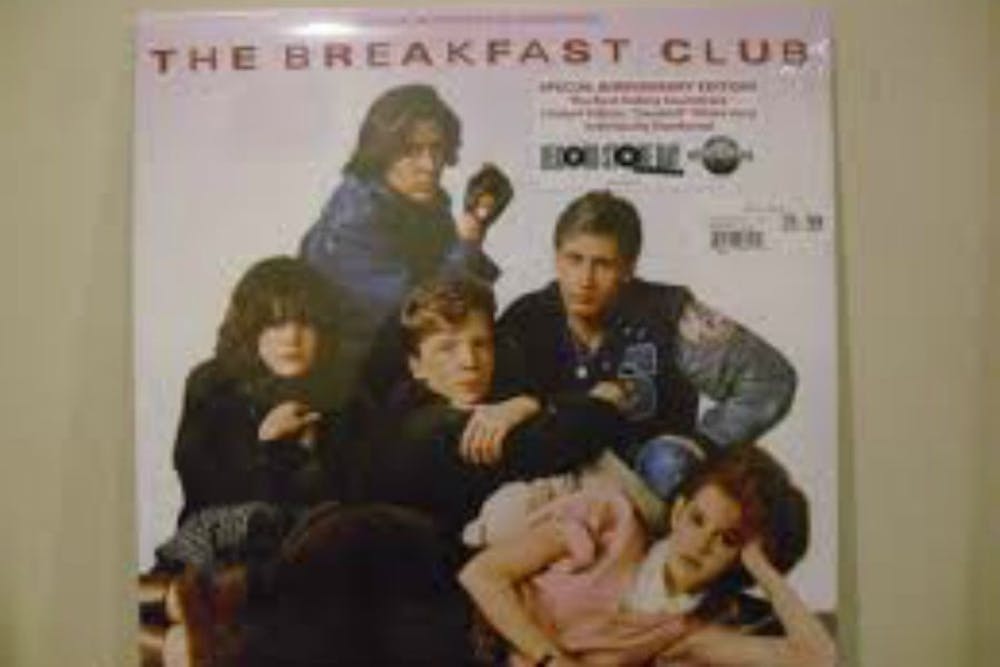By Jack Ryan, Senior Staff Writer
While re-watching the Brat Pack classic, "The Breakfast Club," for the umpteenth time this weekend, I was hit with a strange nostalgia. Strange, because I never compulsively listened to David Bowie as a teenager, nor did I ever use cheesy phrases like, "Eat my shorts." I was born in 1996, after all. Nostalgia, because, from the opening anti-authority quote to the final thematic fist pump, I once again felt the angst and defiance inherent of high school.
This sentiment is clear proof of the universal accessibility of "The Breakfast Club," the modern classic that became the zeitgeist of the 1980s, inspired countless generations and ultimately worked its way into the center of our current pop culture.
For those somehow unfamiliar with this modern classic, "The Breakfast Club" is the story of five distinctly different teenagers who have to spend a full Saturday in their school's library for detention. They are, in no particular order, Andy, the athlete (Emilio Estevez), Claire, the princess (Molly Ringwald), Bender, the criminal (Judd Nelson), Brian, the brain (Anthony Michael Hall) and Allison, the basket case (Ally Sheedy).
Separately, they are each members of their own cliques and social circles, so the beginning of their day is a bit rocky as they adjust. Their stereotypes are written in stone: the athlete must stand up for the princess, the criminal must bully the brain, the basket case must be given stares for her odd behavior, and so on. "The Breakfast Club" breaks new ground when these polar opposites begin to bond over their mutual punishment and their secret similarities, despite their outward differences.
While the cast brings a number of memorable and impressive performances to the table (particularly Judd Nelson), John Hughes' screenwriting and direction are the obvious highlights of this masterpiece, turning a mundane premise into an evocative work of art.
The extreme highs (and few lows) of "The Breakfast Club" can be derived from a 1985 interview with Hughes, who noted that, "Many filmmakers portray teenagers as immoral and ignorant, with pursuits that are pretty base ... But I haven't found that to be the case. I listen to kids. I respect them ... Some of them are as bright as any of the adults I've met."
Hughes shows the young cast the respect they deserve, giving each member of the eponymous club their own chance to shine, handled with equal amounts of gravitas and care.
Of course, even classics have a few slip-ups here and there, and "The Breakfast Club" is not without its faults. The intolerable principal Mr. Vernon (Paul Gleason) can feel overly one-sided in comparison to the well-developed teenagers he's overseeing. The only other major adult character, the janitor Carl Reed (John Kapelos), seems almost unnecessary at points, due to his limited screen-time and lines.
The film can also get carried away with symbolic acts of rebellion, such as a moment when a stoned Andy screams until a library door literally shatters. Fortunately, these kinds of moments are few and far between, and never come off as completely out of the blue.
While it is an amazing movie in its own right, a large reason for the amazing longevity of "The Breakfast Club" lays outside the realm of the movie itself, and in the genre of teen movies around it. Think about the last 'high school' movie you've seen. Chances are that it was the tale of a group of horny, alcohol-craving kids afflicted with the teenage condition: the unbreakable desire to throw a party, get laid or, hopefully, both.
While sex and drugs are certainly accurate staples of young adult life, these films reduce their characters to the "base pursuits," making it impossible for us to truly relate with them. These fun party films have also saturated the recent market, leaving coming-of-age films in the dust for fake recordings of nights we wouldn't care to remember anyway.
The beauty of "The Breakfast Club" is that Hughes fills his troubled and confused quintet with such honest humanity that they not only feel like lifelong pals, but also feel like friends we've had our whole lives. We need more movies like this.
"The Breakfast Club" will be shown on Thursday, Sept. 17 at 8:30 p.m. in Central Quad.

